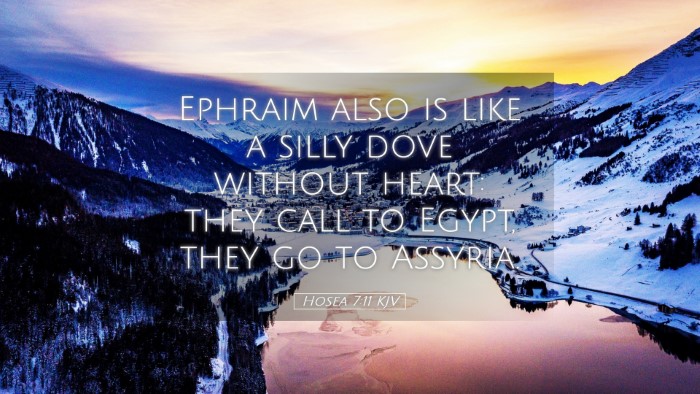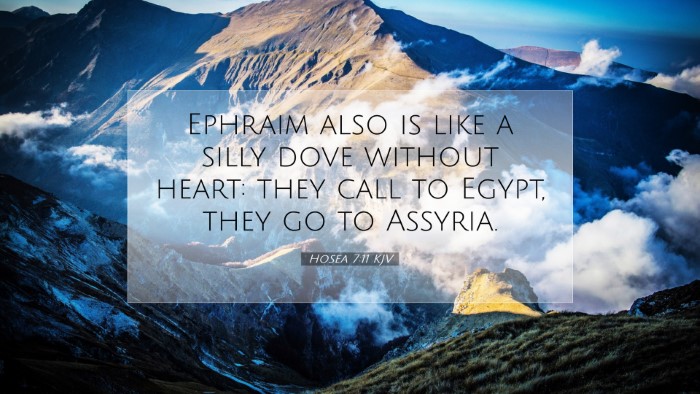Old Testament
Genesis Exodus Leviticus Numbers Deuteronomy Joshua Judges Ruth 1 Samuel 2 Samuel 1 Kings 2 Kings 1 Chronicles 2 Chronicles Ezra Nehemiah Esther Job Psalms Proverbs Ecclesiastes Song of Solomon Isaiah Jeremiah Lamentations Ezekiel Daniel Hosea Joel Amos Obadiah Jonah Micah Nahum Habakkuk Zephaniah Haggai Zechariah MalachiHosea 7:11
Hosea 7:11 KJV
Ephraim also is like a silly dove without heart: they call to Egypt, they go to Assyria.
Hosea 7:11 Bible Commentary
Bible Commentary on Hosea 7:11
Verse Context: Hosea 7:11 states, “Ephraim also is like a silly dove without heart: they call to Egypt, they go to Assyria.” This verse encapsulates the plight of the northern kingdom of Israel, represented by Ephraim, highlighting their foolish dependence on foreign nations rather than reliance on God.
Overview and Significance
This verse metaphorically portrays Ephraim’s lack of discernment and direction in their actions. They are likened to a "silly dove," which reflects both the vulnerability and the lack of wisdom in their choices. This commentary will explore several key themes emerging from this verse, drawing insights from notable public domain theologians.
The Metaphor of the Dove
Matthew Henry's Insight: Matthew Henry notes that the imagery of a dove illustrates the character of Ephraim as easily swayed and lacking sound judgment. Doves are known for their gentleness, but in this context, it signifies their culpable naivety as they fly aimlessly, hence showing how Ephraim is not grounded in wisdom.
Adam Clarke's Observation: Clarke emphasizes that the dove is without heart, denoting a void of understanding and purpose. This heartlessness leads to misguided loyalties, showcasing Ephraim’s misplaced trust in Egypt and Assyria, nations that symbolize the very oppression Israel experienced.
The Call to Egypt and Assyria
Albert Barnes' Commentary: Barnes remarks on Ephraim's reliance on these foreign powers, noting it as a significant betrayal of their covenant with God. Their appeal to Egypt and Assyria represents a superficial remedy for deep-rooted issues in their society and spiritual life, reflecting a grave misjudgment of where their true help should come from.
Theological Implication: This reliance on foreign nations instead of seeking divine assistance denotes a crucial theological point: it is a manifestation of a lack of faith. The choice to seek aid from Assyria and Egypt symbolizes a broader rejection of God’s sovereignty and a failure to understand God’s provision.
Spiritual Application
This Passage for Today’s Believers: The folly of Ephraim serves as a pertinent reminder to modern Christians. Like Ephraim, Christians can often seek solutions in worldly wisdom or worldly alliances—political, social, or economic—rather than turning to God in faith. The enduring question remains: where does our trust lie?
- A Lesson in Faith: The lack of reliance on God can often lead to spiritual impotence. Just as Ephraim looked to Egypt, believers today might look to modern equivalents that promise security but ultimately fail.
- The Heart’s Condition: The mention of “without heart” invites a reflection on the state of our spiritual hearts. Are we anchored in Christ, discerning His leadership and guidance, or are we adrift, relying on our understanding?
- Calling to Repentance: This verse prompts a call to repentance. Recognizing areas where trust in God is lacking is crucial for spiritual growth and restoration.
The Broader Context of Hosea
This verse sits within the larger narrative of Hosea, a book focused on Israel's unfaithfulness and God's unwavering love. Hosea’s prophecies often reflect a deep anguish over Israel’s infidelity, characterized by idol worship and moral decay.
The divine response: Throughout Hosea, God remains steadfast in His desire for repentance and restoration. The imagery of the dove also reflects the spiritual state of Israel: lost, confused, and in need of reclaiming their relationship with the Creator.
Conclusion
Hosea 7:11 serves as a poignant reminder of the dangers of straying from divine counsel. Ephraim's portrayal as a silly dove encapsulates the tragedy of human folly when separated from the wisdom of God. It serves as a call to spiritual vigilance for contemporary believers, urging a return to reliance on God and a steadfast heart in faith.
By drawing insights from Matthew Henry, Adam Clarke, and Albert Barnes, we recognize the timeless relevance of this scripture. It encourages pastors, students, theologians, and scholars to delve deeper into the heart of its message, challenging them to reflect on their own spiritual journeys and the state of their hearts.


